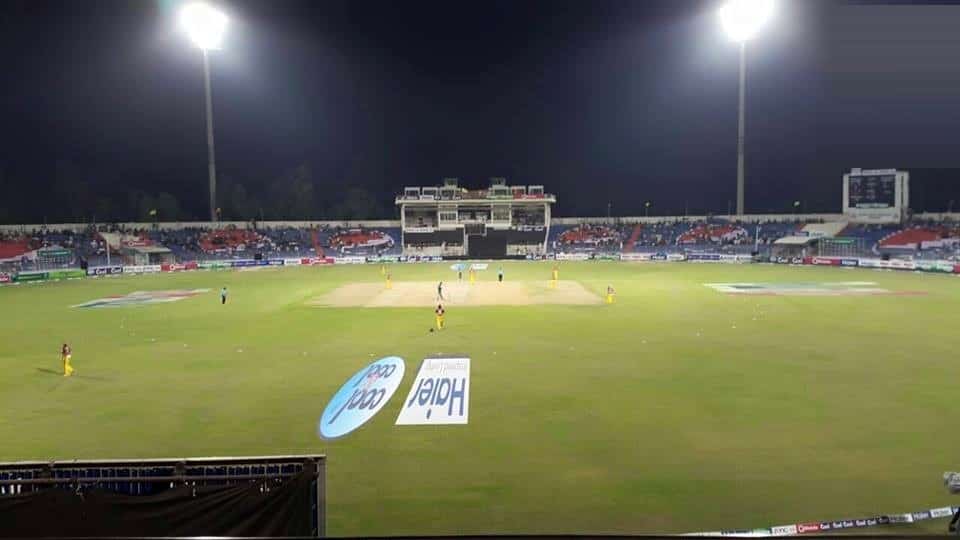The controversy between Pakistani umpire Shakoor Rana and England captain Mike Gatting was one of the worst of those times and almost threatened to end a Test in a manner that The Oval Test of 2006 would do some years later.
Pakistan and England have a history of cricketing rivalry for years and between some of the most exciting that’s played between the two countries, there have also been some quite forgettable moments on and off the cricket field.
We have already spoken about the controversial Test of 2006 in which Inzamam-ul-Haq and Darrell Hair fell afoul of each other which ended the game as a forfeit – the only one in history.
However, many years prior to that, there was another game between these two very teams which could have gone down that very path. That time around it was an English captain and a Pakistan umpire who were involved in an ugly on-field spat that many watched with growing disbelief on their TV screens.
Here’s a lowdown on what went wrong in the 1987 Faisalabad Test match between Pakistan and England.
When did the Mike Gatting-Shakoor Rana incident occur?
The Gatting-Rana controversy happened on December 8, 1987, the second day of the second Test between Pakistan and England that was being played at the Iqbal Stadium in Faisalabad.
Was there a back-story to this incident?
Things had already been simmering between the England team and the Pakistani umpires on the tour.
England hadn’t quite been happy at the way the first Test had been played – and lost – with some blaming the umpiring for their debacle. One of the umpires involved in that Test was Shakeel Khan, who dished out quite a few decisions that went against the touring party.
According to reports, there were nine such occasions in which England was at the receiving end including one that had Gatting given out lbw to a leg-spinner pitched around the off-stump.
The tourists had unofficially requested a change in umpires for the second Test and that’s when Shakoor had been called up to officiate for the Faisalabad game.
Things would go worse for England.
Even before the main, finger-wagging incident between Gatting and Shakoor emerged, the England side had been miffed with the umpire’s decision to wear the Pakistan cricket team’s sweater and later the Pakistan cricket cap too when Mudassar Nazar gave it to him before his bowling.
What exactly transpired in the Gatting-Rana controversy?
The controversy occurred when England bowler Eddie Hemmings was about to run in to bowl to Salim Malik and was stopped by Rana, who was standing at square-leg.
Rana screamed out, ‘stop, stop’ and called it a dead ball. What had happened was that the fielder at square-leg was moving positions even as the bowler was in his action and Rana had deemed it illegal.
Gatting, who was the captain, was in fact telling the fielder to stop moving but more vitally by the laws of the game, there was nothing illegal about the movement because it wasn’t in the batter’s eyeline.
A miffed Gatting, who was fielding at leg-gully at that stage, walked up to Rana and things blew up almost immediately as the umpire looked to have accused him of changing the field illegally. Gatting looked to have lost his mind at the accusation and the two got involved in a slanging match that had a lot of finger-pointing and some choicest words exchanged between the two.
As it turned out, the stump microphone had been on at that time and a lot of the words spoken were relayed to the rest of the world but even that had not been necessary. It was one of those rare instances on the field of play where a player and umpire had gotten involved in the amount of finger-pointing that had been on display in this instance.
In fact even after walking away, the two continued to rant on and wag their fingers against each other on two occasions with Gatting seeming to suggest that Rana needed to get back and do his job.
Third day’s play lost
Pakistan, at this stage, had been struggling, having limped to 106 for five at the end of that day’s play in response to England’s 292. With three more days of play remaining and the bowlers having had an upper hand, it was a game that England could have gone on to win.
Instead, this controversy pushed all of that to the back-seat.
Rana refused to officiate the game unless Gatting apologised to him and while reports suggested there had been informal apology between the two, the umpire was quick to dismiss it.
According to a few unconfirmed reports, Pakistan captain Javed Miandad had coaxed Rana not to start play unless a written apology was tendered. These allegations were refuted by Rana but the fact was that with the issue not sorting out, the third day’s play had to be abandoned.
This prompted the British ambassador Sir Nicholas Barrington to step in and coerce Gatting to write an apology for his action following which the Test could resume on day four.
With an entire day’s play lost to this controversy, England did not have enough time to force a result and the match ended in a tame draw late on day five.
Gatting’s reaction to the Shakoor Rana row
Gatting, who would go on to become an elected member of the Middlesex County Cricket Club and the MCC Committee, did express his remorse for the incident over the years.
In the Cowdrey Lecture of 2013, Gatting stated that while it was necessary to have neutral umpires in international cricket at that stage, it did not excuse his on-field behaviour that day.
He added a good umpire is recognised not just by his decision-making but also by the things are handled in the heat of the battle on the cricket field. Gatting said the handling of players and how bad situations are nipped in the bud are what make an umpire fit for the job.
Gatting admitted that the umpires did have to make tough decisions at times but what was also important was how those were done.
What was the result of the 1987 England’s tour of Pakistan?
After Pakistan had won the first Test at Lahore by an innings and 87 runs, the second Test at Faisalabad and the third at Karachi ended in draws. Pakistan won the three-match Test series 1-0.
This was after England had won the ODI series preceding these three Tests. They had edged out Pakistan by two wickets and 23 runs in the first two games and then crushed Pakistan in the third match by 98 runs.
What did Rana say about the incident?
Shakoor Rana, who had decided not to restart the Test match unless Gatting apologised to him in writing, would later say the English captain was fortunate to have been physically thrashed by him for the insults meted out.
He said:
“In Pakistan many men have been killed for the sort of insults he threw at me. He’s lucky I didn’t beat him.”
In an interview, Shakoor Rana would say he didn’t have too much understanding of swearing in English but was repeating everything that Gatting was saying to him. Rana also claimed he “did not call the England captain a cheat.”
Interestingly, Shakoor would also go on to talk about his only meeting with Gatting after that which came when the umpire would visit England to watch his son Mansoor play in the Bradford League. He said:
“I saw Gatting sitting in a car. I went over because I wanted to talk to him and shake his hand. But he said, ‘Oh God, not you again’ and drove off.'”
Rana had also earlier said he had never seen such an incident happen before involving the captain of a team but things had gotten frayed on at least two previous occasions with him being involved.
Rana was in the middle of two previous controversies
India’s tour of Pakistan 1978-79
In a 1978-79 Test series between Pakistan and India, play was held up for 13 minutes thanks to an argument between Rana and the then Indian captain Sunil Gavaskar.
This was after Rana had accused Indian seamer Mohinder Amarnath of illegally running on to the pitch with Gavaskar contending that the umpire hadn’t raised any eyebrows when the Pakistani fast bowlers had done the same.
Pakistan won the three-match Test series 2-0 and defeated India 2-1 in the ODIs that followed.
New Zealand’s tour of Pakistan 1984-85
Things went one worse in the 1984-85 series against New Zealand when their captain Jeremy Coney, frustrated by Rana’s not-out decision against Javed Miandad, decided to take his team off the field in protest. Play was stopped for a few minutes before Coney was convinced to continue.
Pakistan won the ODI series 3-1 before defeating New Zealand in 2-0 in the Test series.
What was the result of the 1987 England’s tour of Pakistan?
After Pakistan had won the first Test at Lahore by an innings and 87 runs, the second Test at Faisalabad and the third at Karachi ended in draws. Pakistan won the three-match Test series 1-0.
This was after England had won the ODI series preceding these three Tests. They had edged out Pakistan by two wickets and 23 runs in the first two games and then crushed Pakistan in the third match by 98 runs.
The birth of neutral umpires?
It was a time in the sport where the home team arranged for their own umpires to officiate in international games – Tests and ODIs. And it wasn’t surprising that there were a lot of complaints from touring parties regarding the decision-making.
Pakistan great Imran Khan had been one of the voices clamouring for neutral umpires at the international level even before this and this incident only looked to have expedited the process.
This was seen on India’s tour of Pakistan in 1989 when Englishmen John Hampshire and John Holder officiated the entire Test series to avoid any repeats of the Gatting-Rana controversy.
Incidentally, the first instance of neutral umpires had come earlier in 1986 when Indian umpires, VK Ramaswamy and Piloo Reporter officiated in a five-day game between Pakistan and West Indies that was played at the Gaddafi Stadium in Lahore. Strangely this hadn’t been followed for the England tour and things had imploded on field.
The ICC then experimented with fielding one neutral umpire in every Test from 1992 before making this a norm from 1994. A few years later, in 2002, the ICC changed this to having two neutral umpires for a Test and one neutral umpire in ODIs when India toured West Indies.

